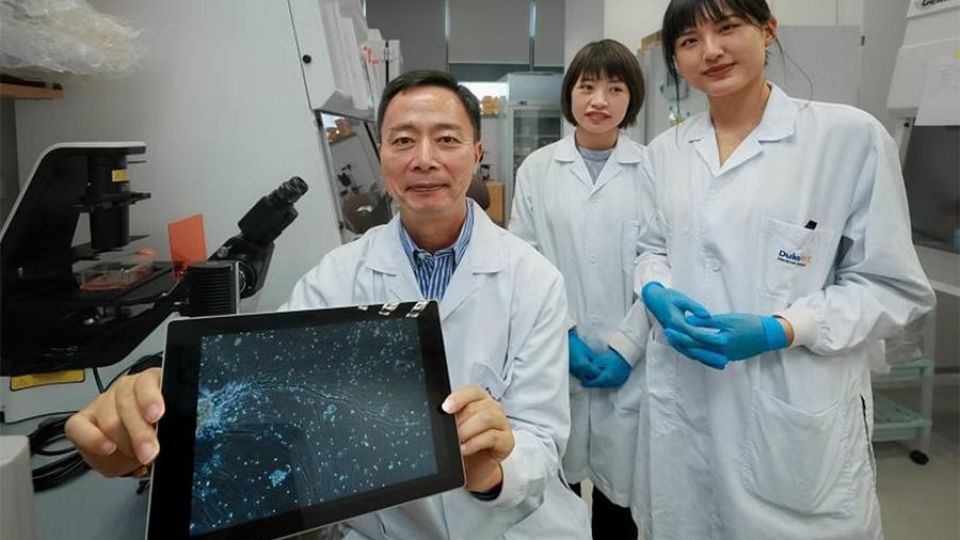December 15, 2023
SINGAPORE – In a major breakthrough, local researchers have transplanted stem cells into the brain to reverse the ravages of stroke and degenerative diseases such as Parkinson’s and Alzheimer’s.
The scientists from the Duke-NUS Medical School’s GK Goh Centre for Neuroscience grew neurons, or nerve cells, from immature stem cells and used them to repair the brains of mice that had ischaemic strokes induced.
Within a month of the transplant, the mice were moving about normally, in contrast to when they had the strokes.
Ischaemic stroke occurs when a blood clot blocks or plugs an artery leading to the brain, cutting off blood supply and killing brain cells. It can have serious, even life-threatening, consequences.
According to the Ministry of Health, stroke is the fourth-leading cause of death in Singapore, with a prevalence of 4 per cent among adults aged 50 and above. The best chance for recovery occurs within the first six hours after the stroke.
Even then, almost all survivors do not recover fully, and there is currently no treatment to restore function completely.
The team at the GK Goh Centre discovered a novel way to give stroke survivors hope.
They used skin cells and blood cells from human volunteers that they reversed to their embryonic state, and then applied stimuli to turn them into brain and nerve cells.
The centre’s director, Professor Zhang Suchun, said the nerve cells were grown in a cocktail made up of fibrinogen, a protein that helps with clotting, and maraviroc, a drug used to treat infection.
This protected the cells from inflammation when they were transplanted into the lesion in the mouse brain where the stroke had occurred.
Before this technique was developed, transplanted cells had poor survival rates, with most dying in the ischaemic cavity of the brain because of inflammation, said Prof Zhang.
“In the pre-clinical trials using animal models, the cells not only survived, but they also successfully matured into the targeted neuron type and repaired the damaged brain in a period of 30 days,” said research fellow and lead author of the study Wang Zhifu.
The paper was published in Advanced Science, an interdisciplinary peer-reviewed scientific journal, in October.
Dr Wang said that before the transplant, the mice that suffered strokes barely moved and were slow and listless. “After 30 days (of the transplant), they seemed to have restored their functions and were moving regularly on the conveyor belt,” he said.
“Our transplantation method has proven that cultivated cells can mature to become functional neurons and potentially integrate into brain circuitry in conditions such as stroke, spinal cord injury and Parkinson’s disease.”
The method of cultivating brain and nerve cells from stem cells has been licensed, and the team has applied to patent the technology, which was also successful in treating other neurodegenerative diseases such as Parkinson’s disease.
Previous studies of Parkinson’s disease by Prof Zhang, in collaboration with scientists from the University of Wisconsin-Madison in the United States, had also found that transplanting cultivated dopamine neurons into the brains of rats with Parkinson’s disease could regenerate damaged tissues.
These nerve cells produce dopamine, which plays a role in pleasure, motivation and learning, but they degenerate with the onset of Parkinson’s disease.
The team is currently seeking approval from regulators in the US to start human safety clinical trials for neuron transplants in patients with Parkinson’s disease.
Using the same technology, the team at the GK Goh Centre is also the first in the world to produce norepinephrine neurons, which are specialised nerve cells located in the brain stem.
These neurons are connected with every part of the brain and spinal cord, but degenerate in patients with diseases like Alzheimer’s and Parkinson’s, sometimes as early as 10 years before the onset of symptoms.
“The production of these cells will enable scientists to study why they are vulnerable and how their degeneration causes the diseases,” Prof Zhang said.
This research was published in the monthly, peer-reviewed scientific journal Nature Biotechnology in November.
These studies into novel ways of cultivating brain cells to treat neurodegenerative diseases were funded by the $5 million donated by businessman and philanthropist G.K. Goh and his family to establish a research centre to investigate the ageing brain and its degenerative diseases.
While these novel ways of cultivating brain cells to treat and study neurodegenerative diseases are still a long way from actual treatments, specialists in the field welcomed the findings.
Professor Tan Eng King, deputy chief executive officer (academic affairs) of the National Neuroscience Institute, said in an e-mail reply to The Straits Times: “The development of this exciting pioneering technology and proof of concept stem cell transplant studies by Prof Zhang and his team will pave the way for clinical trials for various common brain diseases and offers alternative treatment options for our patients.”

